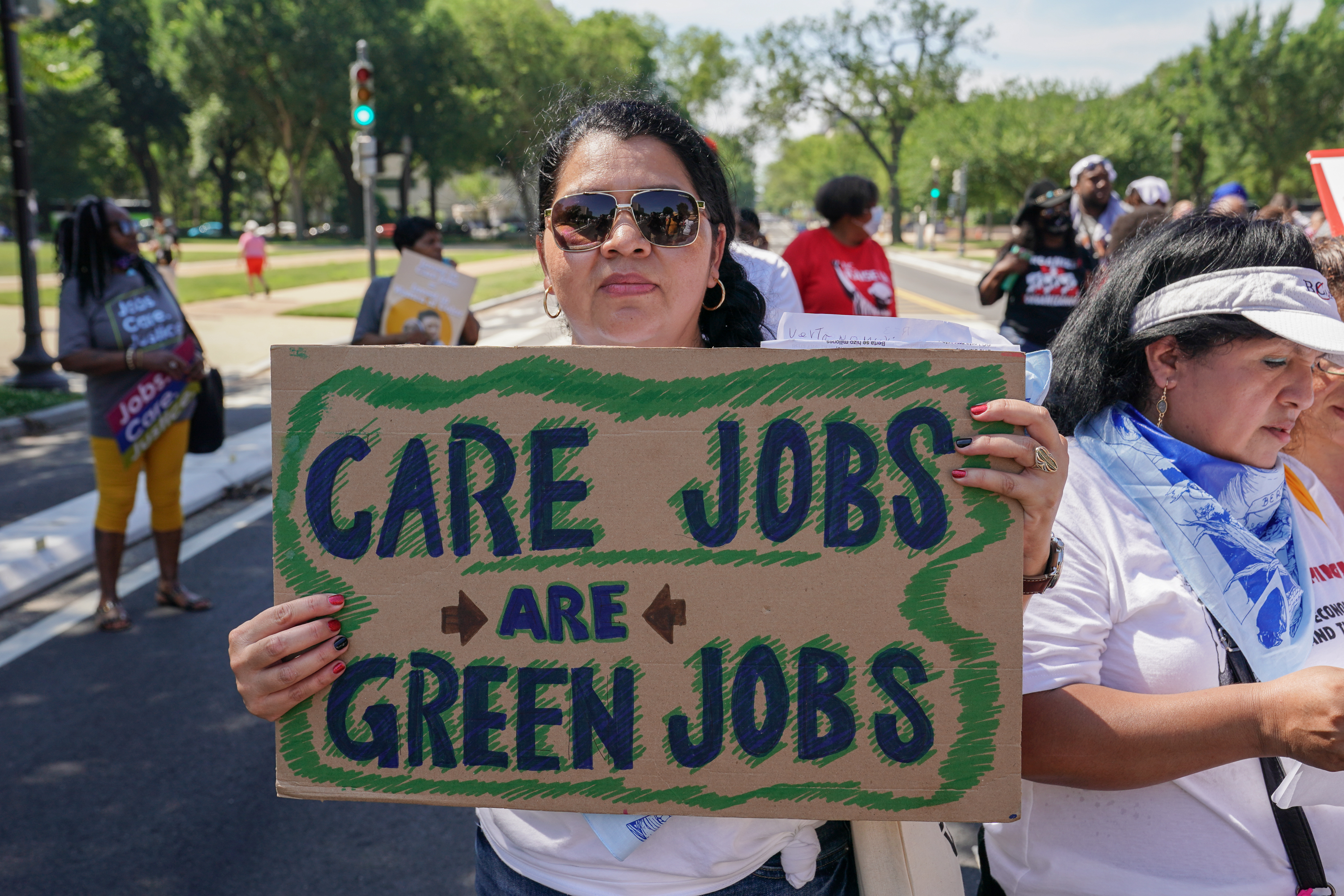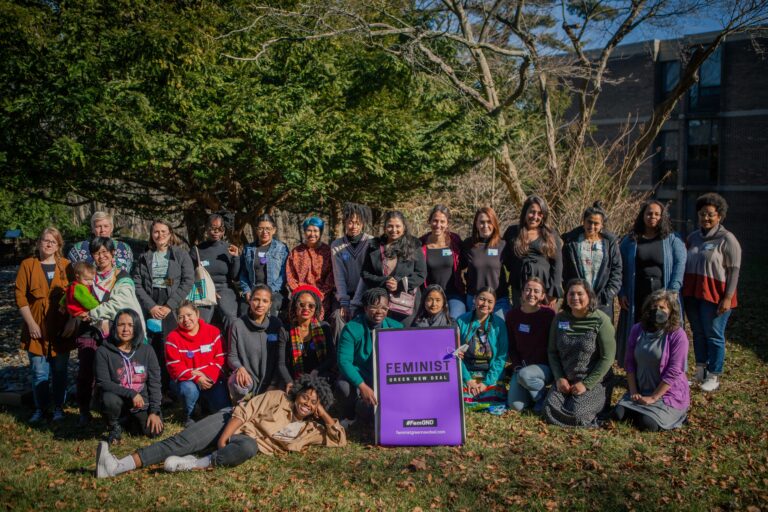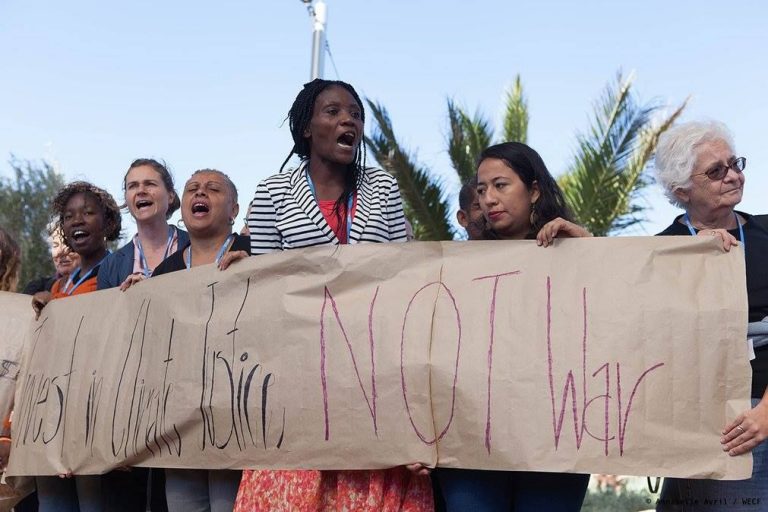New polling and report from the Feminist Green New Deal and Data for Progress shows national respondents believe care jobs are green jobs, and that care should be central to climate, jobs & infrastructure policies
The Feminist Green New Deal Coalition and Data for Progress released new polling on September 21, 2021, finding that a strong majority of respondents believe care should be central to climate, workforce, and infrastructure policies, and that respondents believe care work are green jobs. In the midst of intersecting economic crises, climate crises, and the ongoing infrastructure fights, these findings reiterate that people support bold economic investments that center care for people and the planet. Key findings from the polling include:
- “Green” jobs should refer to all jobs related to the well-being of people and the planet, and that includes care. 69% of all respondents agree that green jobs are any job related to the well-being of people and the planet.
- Polling shows that, although there is initially a bias against care jobs being perceived as “green jobs”, that bias erodes when exposed to specific narratives demonstrating that care is climate work.
- However, respondents find messages around care work being critical, green work and care infrastructure being critical to an equitable green economy persuasive and popular.
For any questions about the report or its methodology, please contact Mara Dolan, mara@wedo.org, who will connect interested parties to Feminist GND coalition members and partners.
Photo credit: WASHINGTON, DC – JULY 13: An activist from the Grassroots Global Justice Alliance hold up signs at a demonstration calling for Care Work to be recognized as Climate Work on July 13, 2021 in Washington, DC. (Photo by Jemal Countess/Getty Images for Green New Deal Network)
Supporting Quotes
- “When hurricanes hit, we leave our homes and families behind and are asked to shelter in place with our clients. Home care workers are often the first responders in a climate emergency, and yet, we rarely get the recognition or resources we deserve for our labor and efforts. As we experienced this past year with COVID, it is care workers who hold up the economy in a crisis.” June Barrett, domestic worker, member of Grassroots Global Justice Alliance and the Miami Workers Center.
- “As a domestic worker, I have not been given the respect or the care I have shown to my employers. I have taken care of your children, elders, and homes, and it’s now time to fight for my rights. In California with all the wildfires, I am seeing my colleagues struggle with asthma. We risk our lives with lung infections due to all the smoke and ash.” Alma Santana, domestic worker, Coordinating Committee Member of Grassroots Global Justice Alliance and a grassroots leader at Mujeres Unidas y Activas.
- “Care jobs are local jobs with a small carbon footprint, like home health care and child care. Investing in these jobs supports thousands of families and provides opportunities for workers transitioning out of fossil fuel industries to more equitably access jobs in the green economy. We must create a culture of collective care for our workers as well. Building a healthy economy includes visibilizing and investing in women workers who play such a critical role in the well-being and stability of all our families and communities,” said Margaret Kwateng, National Green New Deal Organizer at Grassroots Global Justice Alliance.
- “The suffering of this moment is only a glimpse of how the climate crisis is reshaping our institutions and ourselves. Storm and sunny day flooding, fires, and communities hanging on as stranded assets of fossil fuel driven crisis are our reality now and our governments, across the globe, must respond to these extreme shifts with intense investment in community care for people and planet. Those investments must start with those humans who spend their lives sacrificing for the vulnerable, the disenfranchised and the chronically underserved. Now is the time for good governance to convert to care today and tomorrow! And the proof is in the policy,” said Tamara Toles O’Laughlin, President of the Environmental Grantmakers Association.
- “This time of crisis is demanding we move from investments in extraction to investments in care, in all its forms – care for each other, care for our communities, care for workers, and care for planet. The work of caring for others is life-sustaining, life-giving, community-centered, low-carbon work, and it’s far past time it is paid, valued and resourced as it should be. We call on President Biden and Congress to pass the kind of bold, visionary investments in care jobs, care infrastructure and climate action that we need, to transition to a more just economy where we are all cared for,” said Mara Dolan, Advocacy Associate at the Women’s Environment and Development Organization.
- “We must move away from the current extractive economy that is based on the exploitation of Indigenous peoples, Black and Brown communities, women and the land. The climate crisis is rooted in an economic system that encourages corporate greed, unsustainable production, and profit-seeking over the well-being of our communities and the Earth. We need a care economy in which we are uplifting quality of life and well-being rather than production. A care economy is based on healthy human and social values and visibilzing housework, raising children, and caring for the elderly— which is almost always unpaid and undervalued labor by women. We also need to stop the financialization and commodification of nature,and instead respect the web of life with caring reciprocity.We need an economy that centers people and planet,” said Osprey Orielle Lake, Executive Director of the Women’s Earth and Climate Action Network (WECAN)
- “For millennia, women have been the bedrock of the “care economy”—nurturing our families, laboring to better our societies, and stewarding the Earth and its precious resources. As the climate emergency intensifies, so does the burden on our world’s women. We need to invest in transformational, large-scale solutions to create a clean, renewable, and inclusive climate future—one that includes supporting care workers who tend to our children, sick and elders, and the earth. We all need care. Let’s make sure the planet and our people are cared for.” – Kahea Pacheco, Co-Director of Women’s Earth Alliance
- “When climate disaster strikes worldwide, the first line of defense for people in danger comes from caregivers in their communities, who provide urgent aid and lasting support. Every day, caregivers do essential yet underrecognized work to sustain people and their communities. We have a chance to set ourselves on the right path, away from destruction and exploitation that harms people and planet — if we center this care in our policies and in our ways of life. These polling results show that many people have already embraced this reality. Now, we need to build on that to transform all realms of policymaking,” said Diana Duarte, Director of Policy and Strategic Engagement at MADRE
- “The greatest acts in our history were driven by the simple principle and practice of caring. Whether it’s caring for an individual, a family, a community, or Mother Earth, or valuing principles of democracy, human rights, and liberty and justice for all. There is nothing more affirming in life than being loved and cared for. There is nothing more critical to our sustainability as a planet and as humanity than centering care in our culture, in our policies, and in our systems. I applaud this report in uplifting the centrality of care workers as a collective core driver of a living economy, a green economy, a just economy.” said Jacqui Patterson, Executive Director of The Chisholm Legacy Project


